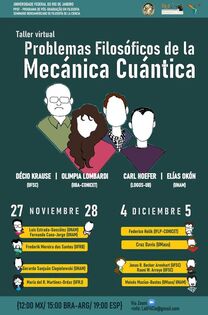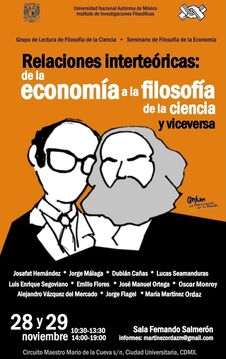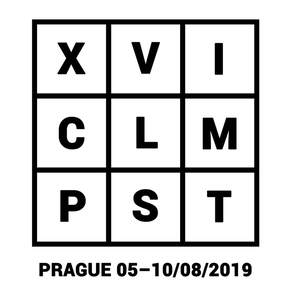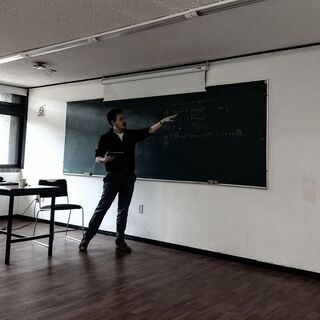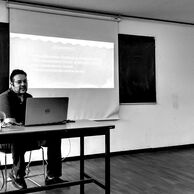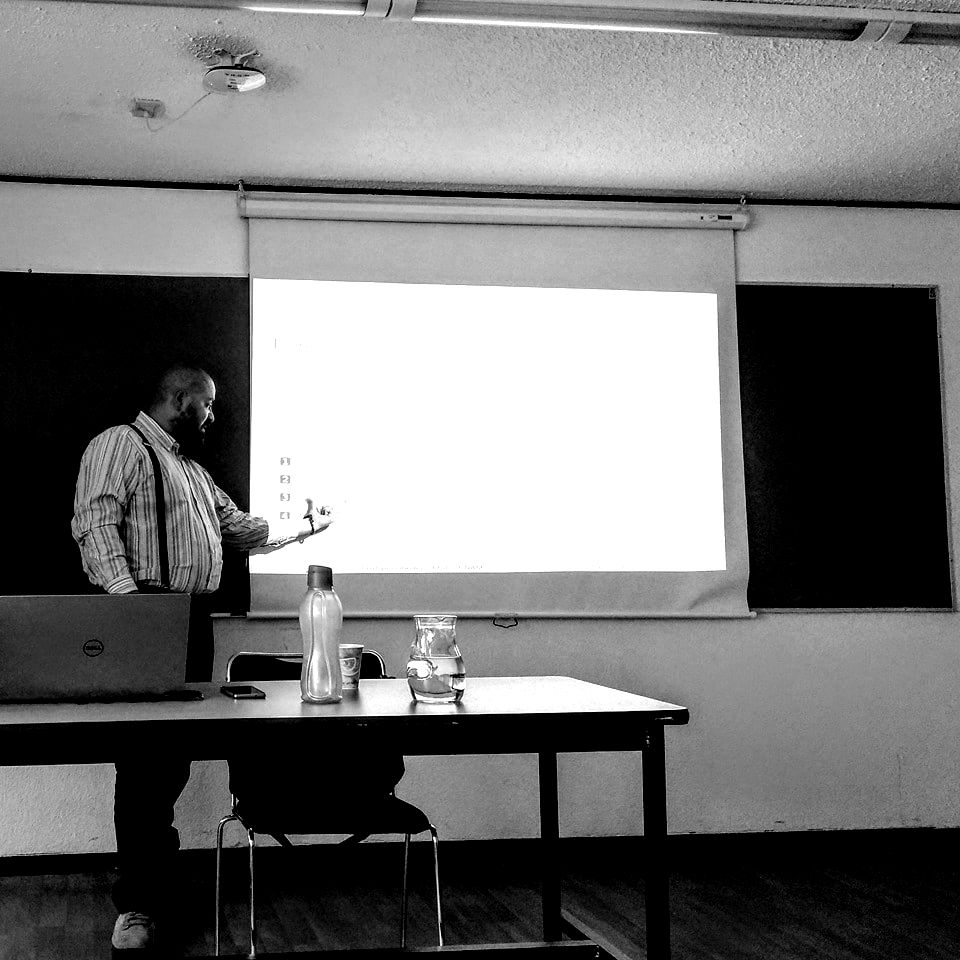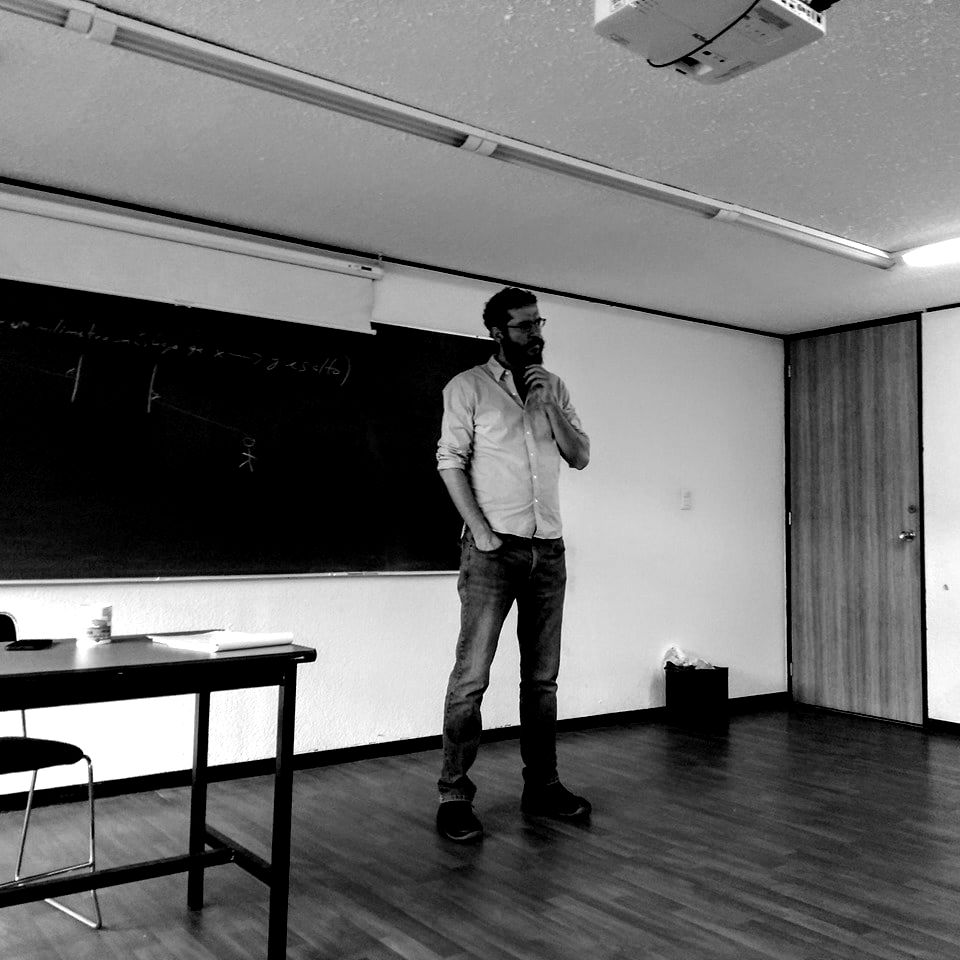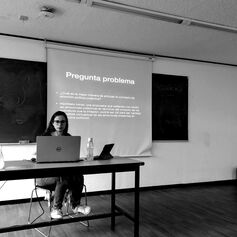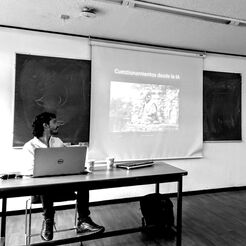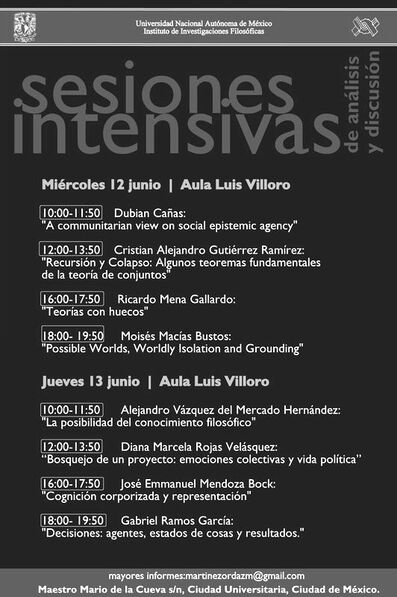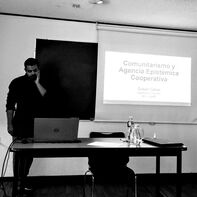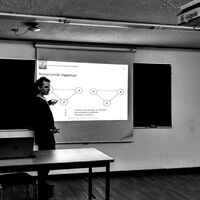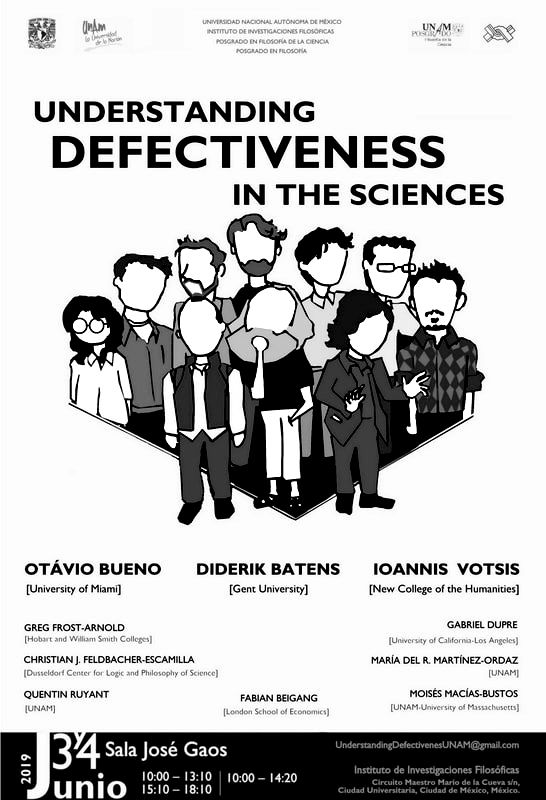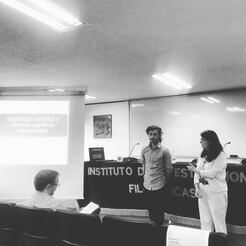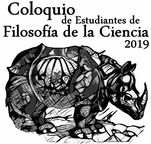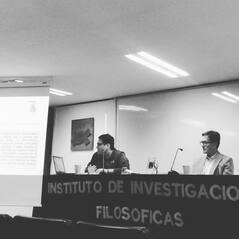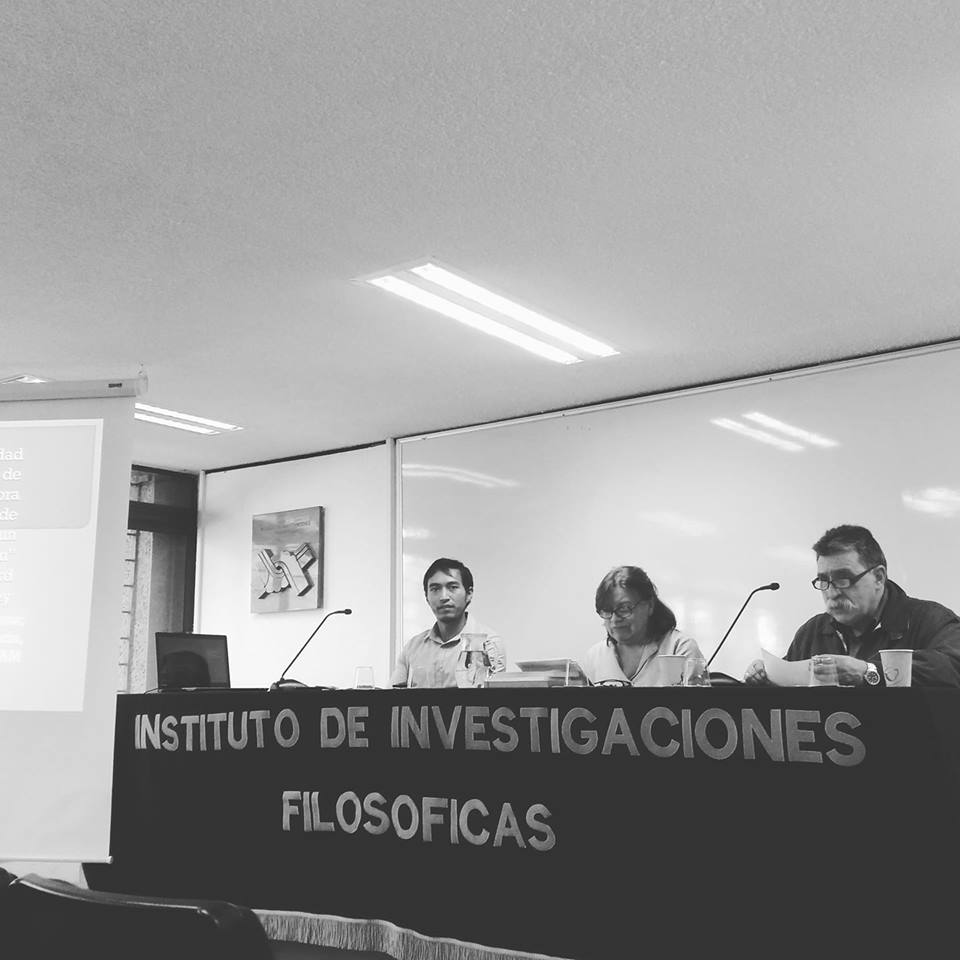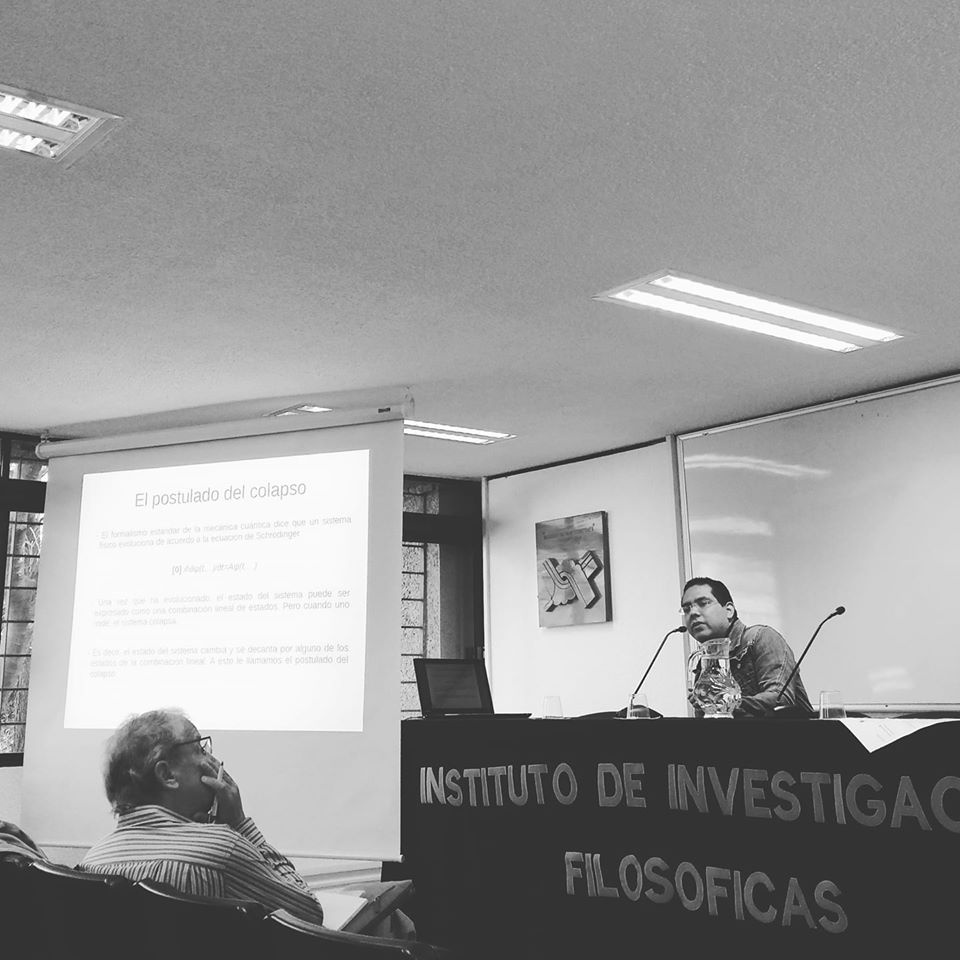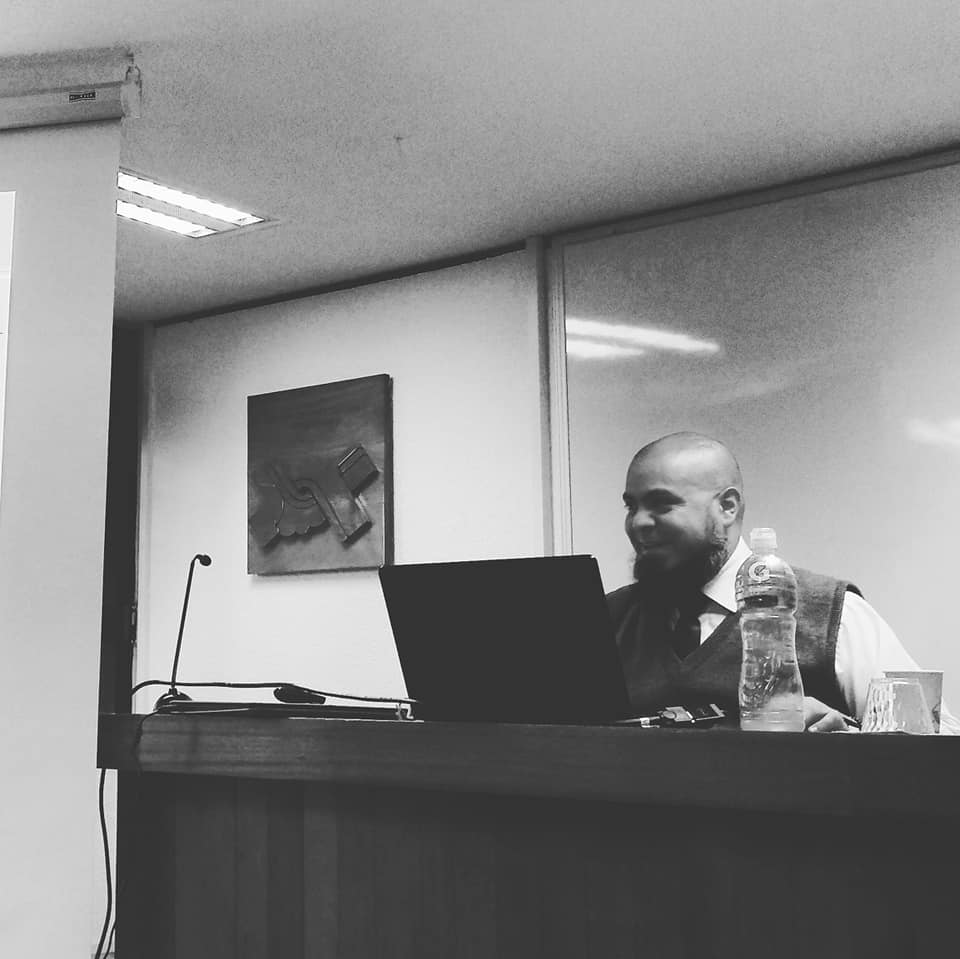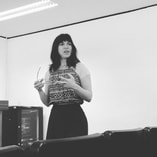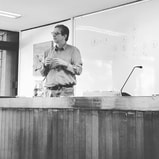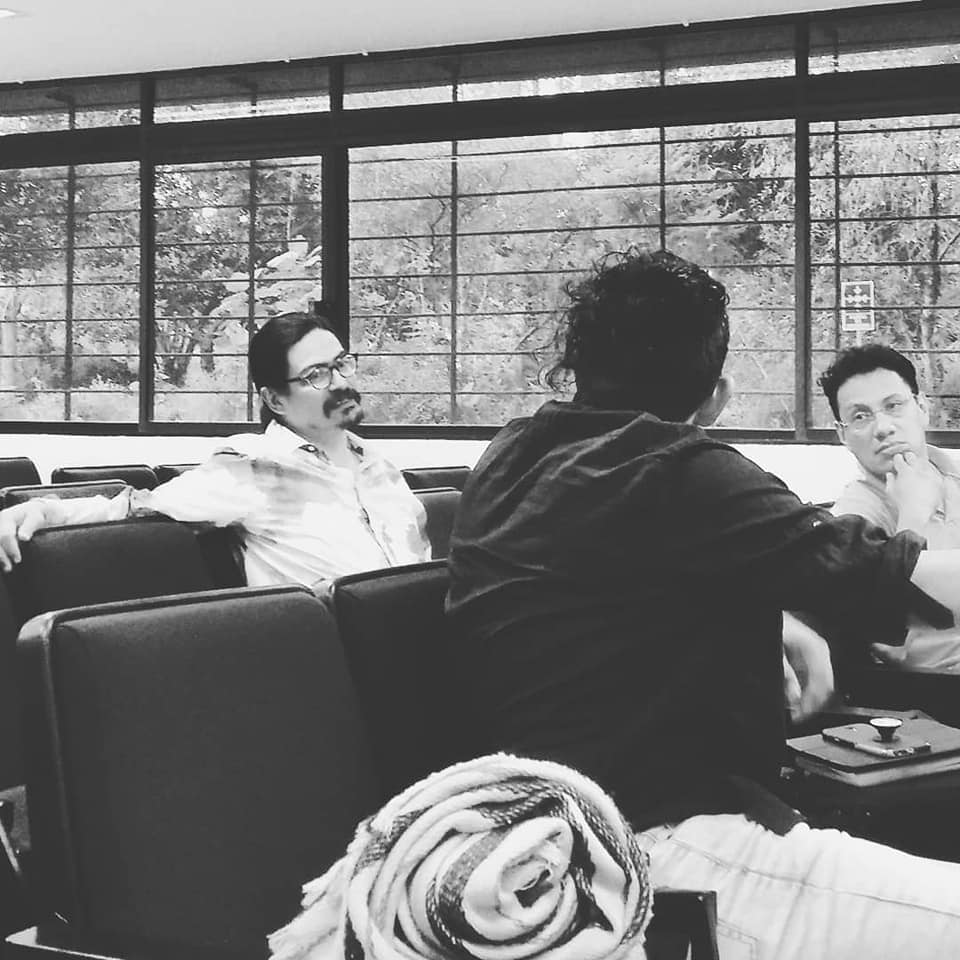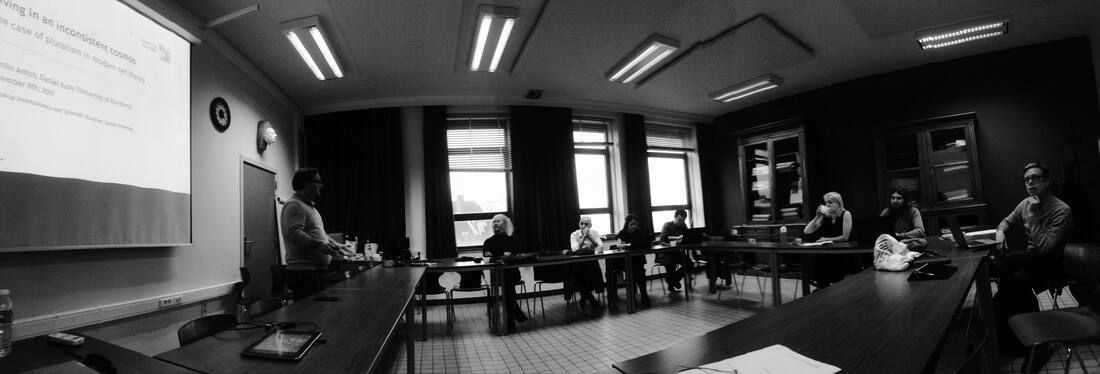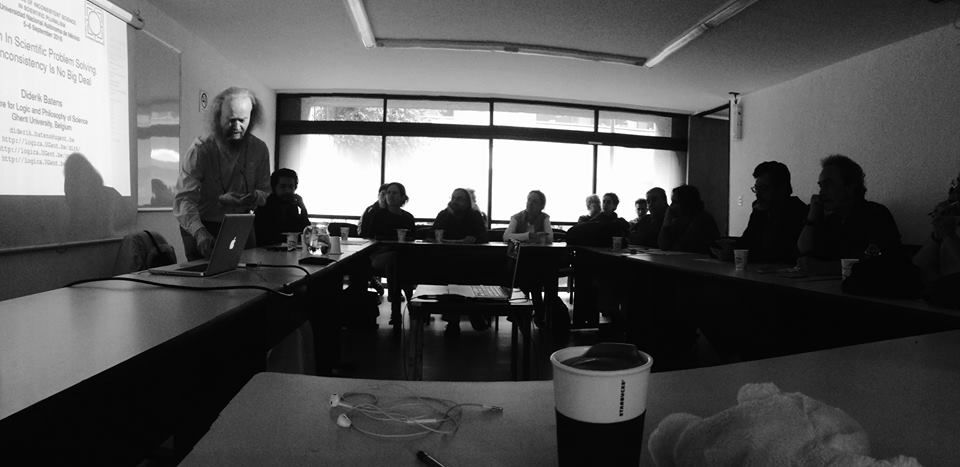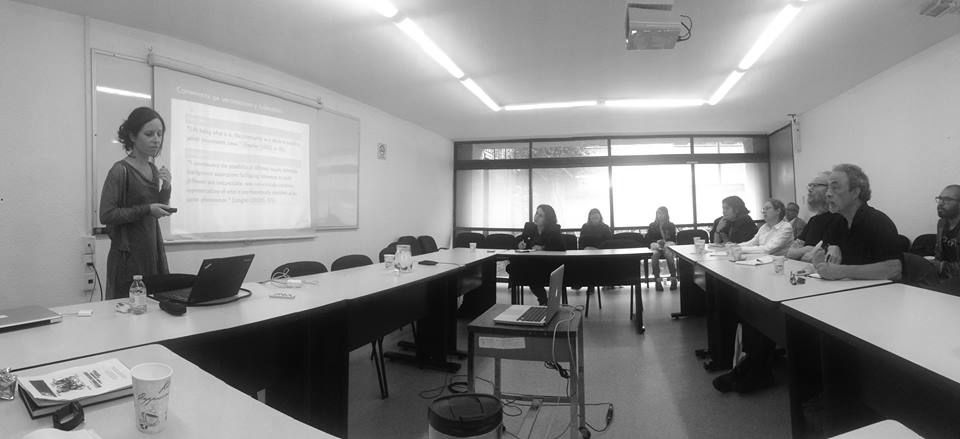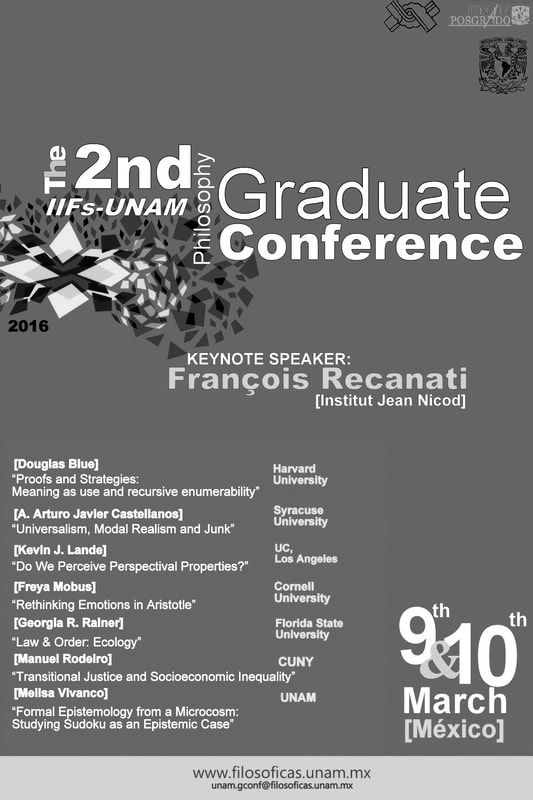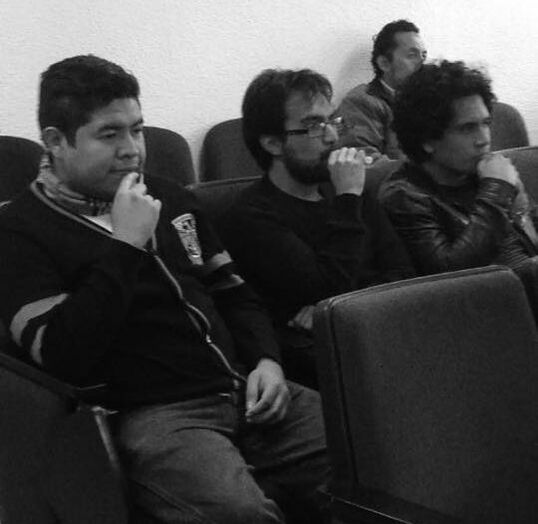Algunos de los eventos que he organizado incluyen
Taller virtual
Problemas filosóficos
de la Mecánica Cuántica
Con Moisés Macías-Bustos
27 y 28 de novimebre, 04 y 05 de diciembre, 2020.
Día Mundial de la Lógica
Desafíos de la lógica en la nueva década
Con Gabrielle Ramos-García
|
|
Taller
Relaciones Interteóricas: De la economía a la filosofía de la ciencia y viceversa
28.29/11/2019
|
|
Simposio:
|
Intensive Sessions for Philosophical Discussion
Comprendiendo los defectos en las ciencias
(Understanding Defectiveness in the Sciences)
Con Cristian Alejandro Gutiérrez-Ramírez and Luis Estrada-González
|
(Ponencias grabadas)
Junio 3- 4, 2019 Instituto de Investigaciones Filosóficas. Es bien sabido que la presencia y el uso de información defectuosa --- falsa, imprecisa, conflictiva, incompleta, inconsistente, parcial, ambigua y vaga --- en la ciencia es ubicua y tiende a verse naturalmente como parte de la dinámica de desarrollo científico. Sin embargo, también se piensa que un agente pueda comprender satisfactoriamente un conjunto de información, dicho conjunto debe cumplir ciertas virtudes epistémicas. Considerando lo anterior, los filósofos y lógicos de la ciencia deberían comenzar a preguntarse cuáles son las posibles conexiones entre la comprensión científica y el uso constante de información defectuosa en la ciencia. El taller incluye contribuciones formales e informales sobre las diferentes formas de explicar y comprender la información defectuosa en las ciencias. |
Coloquio de Estudiantes de Filosofía de la Ciencia 2019
con Blanca Cárdenas and Jorge Armando Romo
|
4-6 marzo 2019 Universidad Nacional Autónoma de México, México. "Coloquio de Estudiantes de Filosofia de la Ciencia 2019" fue un coloquio en el cual 11 estudiantes mexicanos de filosofía de la ciencia presentaron sus trabajos más recientes, mismos que fueron comentados por 11 tutores del Posgrado en Filosofía de la Ciencia-UNAM. |
Normativity across Disciplines
joint with Cristian Alejandro Gutiérrez-Ramírez
|
22 and 23 of October 2018
National Autonomous University of Mexico, Mexico City, Mexico. What ought to be the case? What people ought to think or how they ought to reason? What sciences ought to tell us about the world? All these are normative questions that, since the very beginning, have shaped philosophy in a serious way. While in the philosophical literature it is possible to identify very diverse types of normative questions, there is a peculiar kind that, for decades, has been considered as a paradigmatic case of normativity: formal normativity. Formal normativity is mostly concerned with how certain rules and structures constrain different areas of mathematics, logic, physics, and metaphysics; in some cases, formal normativity has some implications in our understanding of human reasoning, however, it does not go much further. Yet, the scope of such type of normativity seems to be not only formal. As a matter of fact, the majority of the intuitions behind formal normativity are also present (and fundamental) in the development of many other disciplines, such as epistemology, cognitive sciences, empirical sciences and even aesthetics. The workshop Normativity across Disciplines aims at discussing the connections between formal normativity and other areas of knowledge. For this workshop, we want to move forward discussions on formal normativity from logic, mathematics and other formal areas, to other –not necessarily formal–disciplines. We think that reflections on the connections between formal and informal normativity can shed light on the nature of the constraints that philosophy and the sciences share, as well as on the nature of the normative differences among them. The workshop’s title is Normativity across disciplines, and this will be a two-day event that will address questions such as: - Is it possible to endorse pluralistic commitments regarding normativity in formal sciences? - Does a specific type of disciplines (say formal, empirical, social) entail specific types of normativity? - Do particular kinds of normativity entail particular kinds of consequences regarding human reasoning? - Is it possible to identify specific types of normativity that are proper of human cognition and human reasoning? - How can non-formal disciplines inform formal normativity? |
Inconsistency and Scientific Pluralism
Joint with Diderik Batens (UGent), Joke Meheus (UGent), Dunja Seselja (Ruhr-Universität Bochum) and Federica Russo (University of Amsterdam)
|
November 8, 2017
Ghent University, Centre for Logic and Philosophy of Science, Ghent, Belgium. Workshop website: http://www.clps.ugent.be/events/inconsistency-and-scientific-pluralism This workshop is devoted to connections between inconsistency toleration and scientific pluralism. Some views on the topic have recently been analyzed in the HumanaMente Special Issue Beyond Toleration? Inconsistency and Pluralism in the Empirical Sciences (available at: http://www.humanamente.eu/index.php/pages/64-issue32). Different forms of pluralism discussed in the issue include evidential pluralism (Parkkinen, Russo, Wallmann), methodological pluralism (Friend, Llored), and logical pluralism (Batens). We welcome submissions addressing the following and related questions:
|
The Place of inconsistent science in scientific pluralism
joint with Luis Estrada-González
|
September 5-6, 2016.
National Autonomous University of Mexico, Mexico City, Mexico. Video and Abstracts The workshop’s title is The Place of Inconsistent Science in Scientific Pluralism, and this will be a two-days event that will address questions such as:
|
2nd Philosophy Graduate Conference
Institute for Philosophical Research-UNAM
Joint with Efraín Gayosso, Erika Torres-Torres, Bertín Ortega-Polito and Nancy Nuñez.
|
March 9th and 10th, 2016. National Autonomous University of Mexico, Mexico City, Mexico. Videos The 2nd IIFs-UNAM Philosophy Graduate Conference was an event organized by philosophy students from UNAM. The main goal was to promote the academic interchange among the graduate students from different universities, the distinguished keynote speaker, and the philosophical community. The event took place on March 9th and 10th. According to the conference timetable, the sessions took place from 10:00 to 14:00 hours and from 16:00 to 20:00 hours. The keynote speaker is François Recanati (Institut Jean Nicod).The conference had the participation of seven graduate students who presented their papers and will received a reply by a UNAM-student. Talks offered by the following graduate students: Douglas Blue (Harvard University), A. Arturo Javier Castellanos (Syracuse University), Melisa Gutiérrez Vivanco (Universidad Nacional Autónoma de México), Kevin J. Lande (University of California, Los Angeles), Freya Mobus (Cornell University), Georgia R. Rainer (Florida State University), and Manuel Rodeiro (City University of New York). Replies by the following students: Samuel A. Lomelí-Gómez (FFyL, UNAM), Moisés Macías Bustos (Posgrado en Filosofía de la Ciencia, UNAM), Jesús Mauricio Andrade Guzmán (IIMAS, UNAM), Javier Alejandro Godoy (Posgrado en Filosofía, UNAM), Efraín Gayosso Cabello (Posgrado en Filosofía, UNAM), María del Rosario Martínez Ordaz (Posgrado en Filosofía de la Ciencia), and Raúl Ibarra Herrera (FFyL, UNAM). Additionally, the sessions were chaired by researchers from the institute who have experience in working on different areas of philosophy and in the organization of seminars. Chairs: Luis Estrada, Maite Ezcurdia, Olbeth Hansberg, Raymundo Morado, Ana Rosa Pérez, , Cristian Timmermann and Alessandro Torza. We believe that the participation of students and researchers contributes to building a space of philosophical discussion and debate of high quality. The abstracts of the papers that were presented can be accessed by the following link: https://goo.gl/KxrECC |
